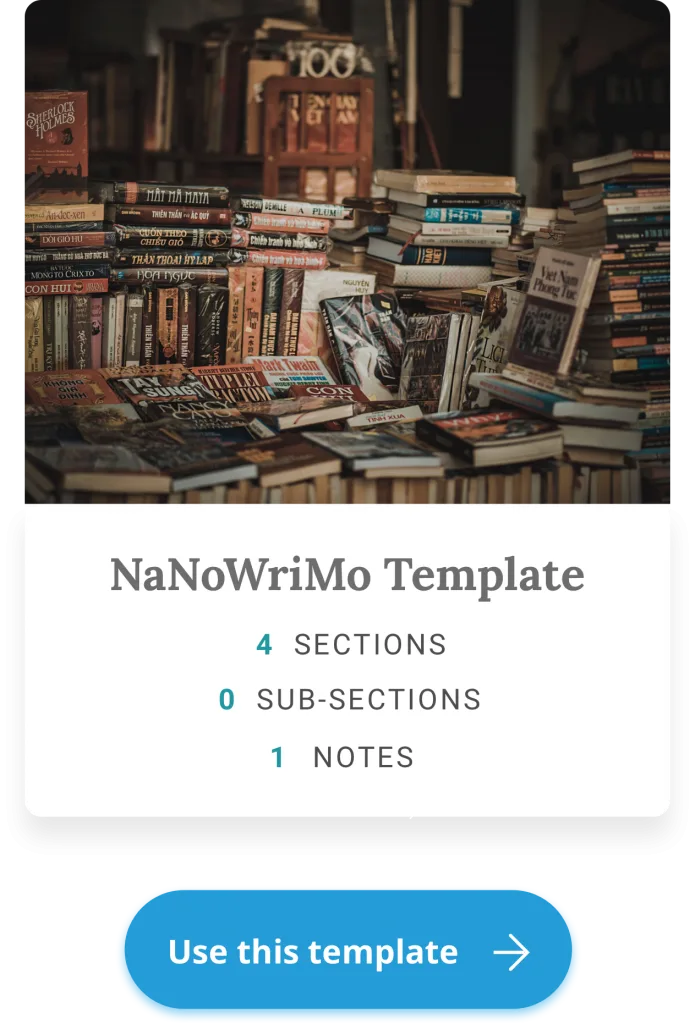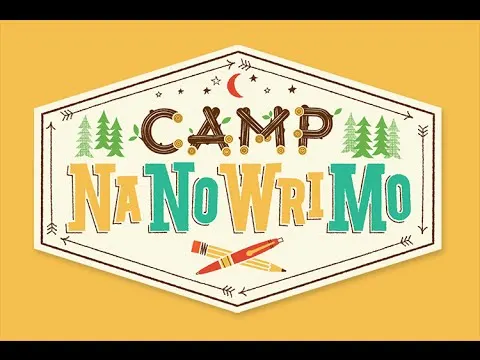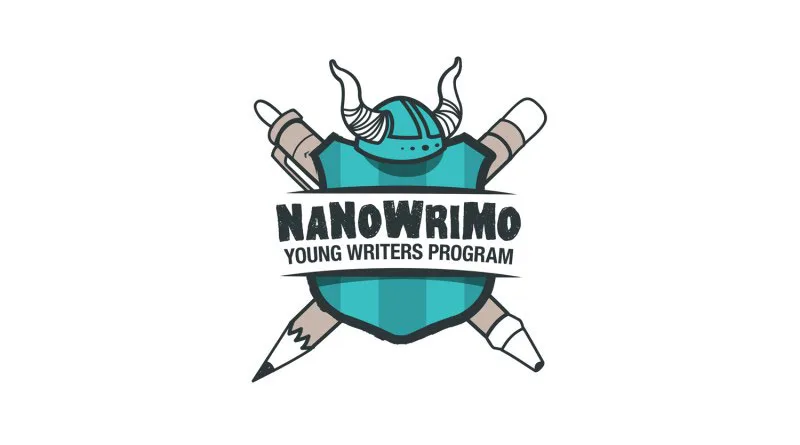Nanowrimo sees budding writers all over the world set themselves the task of writing a novel of at least 50,000 words in a month – that of November. For writers, Nanowrimo is a great chance to try new things – the pace of the challenge forces you to take some risks. Nonetheless, it’s worth setting out with some idea of potential writing mistakes, especially if this is your first Nanowrimo and even more so if it’s your first novel.
Nanowrimo Template
If you are a first-timer reading this precautionary tale, I strongly suggest using our Nanowrimo template to help you as you navigate your journey. It will help you stay on pace and not get too overwhelmed.
Even if you are a seasoned Nanowrimo participant, the template can help you get through the month even faster and easier. It can be found here:

The template includes goal tracking with reminders each day of your target word count. It also offers simple prompts that when followed, ensure your story stays on track and every part of a good story is included.
Giving up at the End (Not Continuing to Write After Nanowrimo)
One of the Biggest Writing Mistakes: Throwing your Novel Away
The Mistakes
I remember when I wrote my first Nanowrimo. I can’t list the number of things that went wrong. Certainly more than twenty! Here I’ve pared them down, though, for the sake of convenience. I’d like you to avoid some of the pitfalls I faced. Hey, take it from me – I learned the hard way. So, here goes… twenty Nanowrimo writing mistakes first-time participants make:
1. Planning Too Much
Don’t procrastinate on the actual writing. While it’s vital to have a well-thought-out plot, too many writers get dug deep in world-building and designing the baroque architecture of their story and before they know it it’s mid-November and they’re way behind on word count. Novels are yarns, at the end of the day, not D&D encyclopedias!
2. Planning Too Little
On the other hand, don’t set off with no idea where you’re going. You’ll paint yourself into a corner. While we’re understandably nervous to hit that daily wordcount target, it’s perilous to just write for the sake of writing. Have at least a decent sense of the main characters and the three-act trajectory of the book and the words will flow. Some days you’ll be under target, but other days, thanks to a well-designed plan, you’ll be happily going over.
3. Being Unrealistically Ambitious
Don’t try to write War and Peace. You’ve only a month and roughly 50,000 words, and it’s much more satisfying to achieve a reasonable goal than fail an outlandish one. Remember: Nanowrimo is about writing discipline, about flexing that writers’ muscle, not about penning the next Booker prize winner.
4. Misuse of Commas
Commas help the rhythm of a text. They cause the reader to pause mid-sentence. To see if you have too many, read your work aloud and check if it sounds like you’re pausing too much or too little.
5. Trying too Hard to be ‘Literary’
Pretension gets in the way of great writing. Write from the heart, write what you know, write in a vernacular that makes sense to you. Your text will come out authentic and will be a breeze to read. Forced hifalutin vocabulary and overly elaborate sentence structures will sound like what it is: forced. What’s more, you’ll effectively be copying someone else, rather than speaking from your own experience and knowledge. Remember: literature is words on the page, from the soul.
6. Incorrect Capitalization
Budding fantasy and sci-fi writers are some of the worst culprits for this particular pitfall. Their novels can be splattered with unnecessary capitalizations like ‘the Goblin entered the Grove and met the Apothecary and consumed his Powder’. It’s not big or clever: it just looks silly! Try to reserve capital first letters for proper nouns – people with official titles, businesses, locations, for example. This is one of the writing mistakes that just shouldn’t be made – familiarize yourself with proper capitalization rules.
7. Doing a Side Project
Nanowrimo is a pretty big endeavor even for experienced wordsmiths. What’s the point in taking on the challenge if it isn’t your main focus? Do give it your all and you’ll be more pleased with the results come December. That’s not to say you can’t take a break – but try to take your time out on non-literary endeavors: go for a hike, cook a nice dinner. Don’t procrastinate on your novel by composing a zine or a new webcomic!
8. Spelling and Grammatical Writing Mistakes
While most word processors have a decent spell-checker, keep in mind that they won’t correct words that are spelled correctly but used in the wrong context, like ‘they’re’ when you mean ‘their’ or ‘there’.
9. Wordiness
Along the same lines as trying too hard to be literary, excessive wordiness can hamper the readability of your novel. Some writers may think they’ve hacked Nanowrimo – beefing up their word count by using more words than they really need to convey a description or the movement of the plot. This will only lead to a poorer book in the long run and leave you unsatisfied with your efforts. Try to let the words flow from a compelling idea, complex protagonists, and a well-planned-out narrative, rather than pretentious verbosity.
10. Doing Nanowrimo in School
Studying is hard enough without trying to write a novel at the same time. One of the two will inevitably suffer, especially since school and university involve a ton of writing. Why spread yourself too thin? Of course, if you really have to, then go ahead, take the risk. But – my advice is: if you want a really satisfying Nanowrimo experience, one that’ll have you coming back year after year and – more importantly – writing avidly in the interim – then pick a November when you don’t have heavy study to take care of simultaneously.
11. Missing Determiners
A surprising number of writers habitually miss out determiners – words like ‘a’, ‘the’, and ‘an’. Confusing the reader and breaking the flow of the text. Its one of the simpler writing mistakes that can be easily avoided. Missing these words also means missing steps towards your daily wordcount target.
12. Not Having a Good Idea (Worth 50,000 Words)
Great novels are built from great concepts. Plot, character, description, all are essential, but these must flow from a core idea – maybe a philosophical question, or your own life quandary. The core question or dilemma at the heart of your novel will inspire the formulation of all the other necessary elements in the story and will motivate you to keep going. It will give you the essential meaning and purpose behind your efforts, keeping you, the writer, writing and – ultimately – the reader reading. Hey, you’ll need it when November 25th rolls around.
13. Not Having a Proper Story Structure
The biggest fail for budding writers is this one. A lot of us love the worlds and characters we imagine so much that we want to jump straight in and get writing. That enthusiasm is admirable, but it can lead to tragedy down the line: without a proper narrative arc – with three acts, a beginning, middle, and end – you’re going to get lost and possibly DNF your novel. At best, you’ll confuse future readers. While the principles of plot can’t be condensed into a simple aphorism here, one book is worth checking out: Robert McKee’s ‘Story’. While it’s written for screenwriters, the same advice applies, and you won’t find a better guide to narrative than this. It’s a must-read for writers of any hue.
14. Burn-out
Don’t start out with manic all-nighters from the 1st of November. Your excitement and dedication is admirable, but save it up. The key to penning a successful Nano-Novel is consistency. Try to hit those daily word targets (sometimes you’ll be over, sometimes you’ll be under), but don’t dive in trying to complete your whole masterwork before half the month is through. Writers who start out this way may think they’re ahead of the curve, but they usually crash and burn and end up with an unfinished mess before the end of the month. Writers who take breaks, get good sleep and think it through are more likely to end satisfied with a piece of work they can be proud of.
15. Giving up Part-Way Through
Don’t lose faith! One mantra I always tell myself when I get stuck in the mud with storytelling is this: finished beats good. While the other nineteen bits of advice here are worth following closely, no failure is worse than, or worth, giving up entirely. Even a disastrous novel will teach you something: about yourself, about story, about writing. That experience is vital to growing as a wordsmith and will steel you for the future.
16. Not Really Knowing your Protagonist
Readers want to read about real people. It doesn’t matter whether your story is set in modern-day Arkansas, Elizabethan England, or on a futuristic space colony. People (or aliens) are people. Believable characters will shine through if they’re based on your empathetic sensibility and properly drawn, with all the contradictions and nuances of actual human beings. Clichés will bore and frustrate your audience, and they will be harder to write about since they don’t have the depth and richness of a real personality. Think about those you know – their psyches, their appetites, and aversions – and try to adapt them into your fiction, rather than plucking a cookie-cutter imitation from the library of literary tropes. As ever, writing what you know – even if it’s transposed into a fantasy environment – is the best course of action.
17. Editing Right after Finishing
A novel is like a stew. It needs time to rest and blend once you’ve put it together. Don’t go poring over everything right off the mark once December rolls around. Sleep on it. Better yet – take twenty sleeps, then come back to it. You’ll see it with fresh eyes. That clearer vision will be more like that of potential readers, and you might surprise yourself: flaws you had obsessed over will seem like happy quirks, passages you saw as powerful description will look like purple prose. Time heals all literary wounds.
18. Not Enjoying the Process
Writing is an exercise. If you fantasize all day about winning the Hugo award but never set words on paper, how can you call yourself a real writer? The only way to guarantee consistent writing practice is to enjoy the process itself – with all its embarrassment, soul-searching and wrong turns. A pure obsession with the outcome – a best-selling novel, a glittering career, riches – will not get you out of bed to write your next few thousand words for the day. Why so? Because it’s a misty and far-off dream. What will get you to that blank page each day with motivation and focus is a love of the process itself. It’s not about the victory – it’s about the struggle.
19. Giving up at the End (Not Continuing to Write After Nanowrimo)
Some feel so shattered by the experience of Nanowrimo – its pace and discipline – or so unsatisfied with their final work, that they throw in the towel and cease trying to be writers after the month is out. You couldn’t do worse. Most great novels were not written in a month. In fact, most great novels are rewrites. The aim of Nanowrimo is not to create a masterpiece: how many novels have you enjoyed that were written for Nanowrimo? The aim of Nanowrimo is practice: it’s a kind of solitary jamming, a way of getting into the habit of churning words on the daily and making yourself accountable. Perhaps you’ll never look at your Nano novel again. Or perhaps you’d rather never think about it again. All fine. Just don’t give up on yourself. Behind great novels and great novelists lie roads strewn with discarded drafts and plenty of writing mistakes.
20. One of the Biggest Writing Mistakes: Throwing your Novel Away
Okay, I lied earlier on. This may be one of the biggest writing mistakes new writers make. So you think you made a hash of it? Keep it anyway. Painful as it may be to have something that feels like trash hogging your hard drive, you may find it isn’t so bad when you look at it later on with fresh eyes. Or – if it still sucks – you can learn from it. Failure is a necessary step on the road to success. Keep all your work. That applies to Nanowrimo – and beyond.



